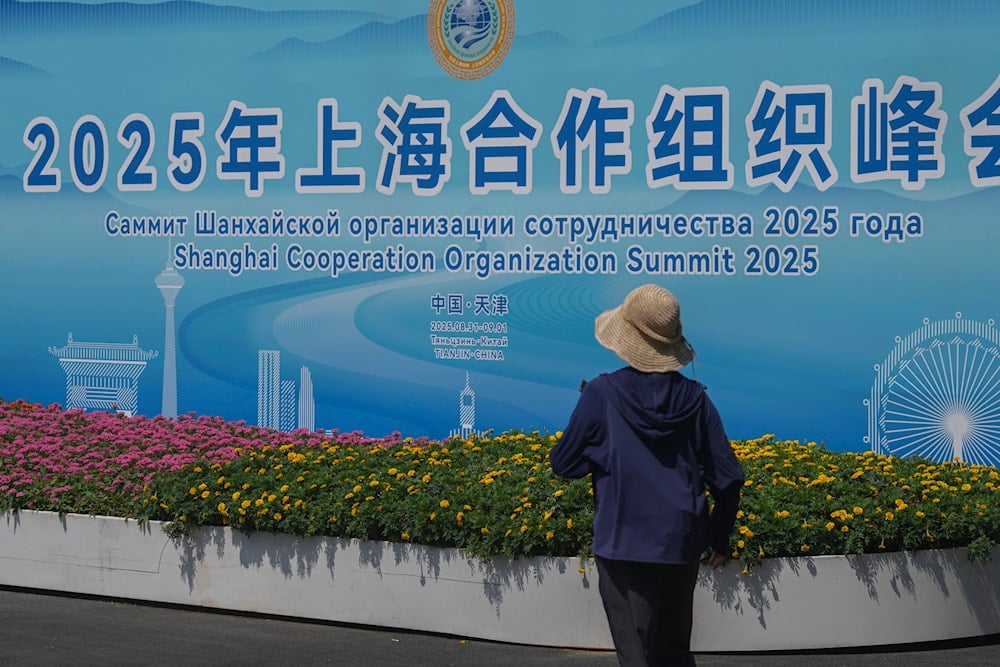Modi, Putin arrive in China's Tianjin for security summit
Putin, Xi, and Modi meet in Tianjin for the 2025 Shanghai Cooperation Organisation summit, highlighting growing Global South unity and resistance to Western pressure.
-

A woman walks past a sign set up for the Shanghai Cooperation Organization (SCO) summit outside its venue in Tianjin, China, on August 31, 2025. (AP Photo/ Rafiq Maqbool)
Russian President Vladimir Putin arrived on Sunday in the northern Chinese port city of Tianjin for a four-day visit, coinciding with the Shanghai Cooperation Organisation (SCO) summit. His arrival was marked by a red carpet reception and a formal welcome by senior Chinese officials.
The visit underscores Russia’s strategic pivot toward China, its largest trading partner, amid its pivot toward the Global South over the Ukraine war. Chinese state broadcaster CCTV described bilateral ties as being at their "best in history," characterizing them as the "most stable, mature and strategically significant among major countries."
The 2025 SCO summit, hosted by Chinese President Xi Jinping, brings together nearly 20 world leaders in Tianjin. Indian Prime Minister Narendra Modi is attending the summit for the first time in seven years, alongside leaders from Central Asia, the Middle East, South Asia, and Southeast Asia.
The SCO, originally a six-member security-focused bloc founded in 2001, has grown to include 10 permanent members and 16 observer and dialogue partners. Its remit has expanded from counter-terrorism to broader cooperation on economic, military, and strategic matters. Xi is expected to leverage the gathering to showcase an emerging international order not led by the West, while also extending a diplomatic lifeline to Moscow.
Russia and China push back against Western sanctions
Ahead of his visit, Putin condemned Western sanctions in a written interview with China’s Xinhua news agency, noting that Moscow and Beijing jointly reject "discriminatory" trade practices and emphasized their alignment in global economic governance.
On the sidelines of the summit, Chinese President Xi Jinping and Indian Prime Minister Narendra Modi held a bilateral meeting in Tianjin, their first since a breakthrough dialogue last October. The talks come just five days after Washington imposed steep 50% tariffs on Indian goods, citing New Delhi’s ongoing energy trade with Russia.
Analysts suggest the meeting signals a tentative effort by Beijing and New Delhi to present a united front against mounting Western pressure.
India-China relations enter new phase of engagement
In recent weeks, both governments have resumed direct flights, lifted reciprocal tourist visa restrictions, and reopened channels for economic and cultural exchanges. China has also agreed to ease export controls on rare earths, fertilisers, and tunnel boring equipment, steps seen as conciliatory.
Chinese Ambassador to India Xu Feihong recently declared that Beijing "firmly stands with India" against unilateral tariffs. The move comes as New Delhi seeks to navigate growing friction with Washington, while preserving ties with both Beijing and Moscow.
"The Modi-Xi meeting is likely to reiterate the commitment to continue along that path with broader government-to-government and people-to-people engagement," said Manoj Kewalramani, a Sino-Indian relations expert at the Takshashila Institution in Bangalore.
As the SCO summit unfolds, the interactions between Xi, Modi, and Putin may signal deeper realignments within Asia and a shifting global landscape where the Global South seeks a more assertive role.

 3 Min Read
3 Min Read








